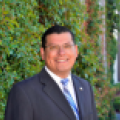32nd Assembly District
Not in 32nd Assembly District? Find your guide.
RETURN BALLOTS BY TUESDAY, MARCH 3RD
The Courage California Voter Guide compiles the information that allows you to make informed decisions about the races on your ballot, based on your values. Vote in every race on your ballot! It's our right and our responsibility. Please share this guide with your friends and family.
Have questions about voting in Kern County? Find out how to vote in Kern County.
Congress
22nd Congressional District
Bobby Bliatout is the son of Hmong refugees who moved to the Central Valley when he was four years old. Bliatout grew up in the Central Valley and attended Cal State Bakersfield. According to campaign materials he is running to represent District 22 in Congress because he believes middle class and working families are being left behind, while the wealthy and powerful continue enriching themselves. He pledges to focus on solving issues important to Valley families, including health care coverage, the homelessness crisis, and climate change-related threats to farmlands, water, and air pollution.
Bliatout is the Chief Executive Officer of two community clinic networks operating in the greater Fresno and Sacramento areas, which together provide medical and dental services to more than 100,000 patients and employ nearly 300 people. Bliatout has also worked as a farmer in the Central Valley, an experience that left him with a deep understanding of the challenges experienced by many Central Valley families connected to agriculture.
Bliatout is running against Representative Devin Nunes (R) who is the incumbent and has held the seat since 2003. Nunes is one of President Trump’s strongest allies in Congress, holding a seat as the top Republican on the House Intelligence Committee and the No. 2 Republican on the House Ways and Means Committee. In addition to his extreme right-wing legislative agenda, there is strong and compelling evidence that Rep. Nunes is centrally involved in the Ukraine scandal at the center of the impeachment of President Donald Trump. Other challengers in this race include Phil Arballo (D), Dary Rezvani (D), and Eric Garcia (NPP). Arballo has been able to produce superior fundraising totals to Bliatout at this point, however, we have great confidence that whichever Democrat advances to the general will receive sufficient fundraising support, given Nunes’ trail of misdeeds.
According to recent election results, it is challenging for a Democrat to win this district. However, in 2018, Democratic challenger Andrew Janz lost by a much narrower margin than usual, suggesting that it is possible for a strong challenger to win this seat in a presidential election year, as turnout will increase for Democrats across the board. Bliatout is the progressive choice because he has a comprehensive progressive policy agenda, emphasizes a community-based approach to governance, and has key supporters that can help him win the district.
According to our analysis, Bobby Bliatout is the strongest choice for progressive leadership in office and deserves your vote.
Bobby Bliatout is the son of Hmong refugees who moved to the Central Valley when he was four years old. Bliatout grew up in the Central Valley and attended Cal State Bakersfield. According to campaign materials he is running to represent District 22 in Congress because he believes middle class and working families are being left behind, while the wealthy and powerful continue enriching themselves. He pledges to focus on solving issues important to Valley families, including health care coverage, the homelessness crisis, and climate change-related threats to farmlands, water, and air pollution.
Bliatout is the Chief Executive Officer of two community clinic networks operating in the greater Fresno and Sacramento areas, which together provide medical and dental services to more than 100,000 patients and employ nearly 300 people. Bliatout has also worked as a farmer in the Central Valley, an experience that left him with a deep understanding of the challenges experienced by many Central Valley families connected to agriculture.
Bliatout is running against Representative Devin Nunes (R) who is the incumbent and has held the seat since 2003. Nunes is one of President Trump’s strongest allies in Congress, holding a seat as the top Republican on the House Intelligence Committee and the No. 2 Republican on the House Ways and Means Committee. In addition to his extreme right-wing legislative agenda, there is strong and compelling evidence that Rep. Nunes is centrally involved in the Ukraine scandal at the center of the impeachment of President Donald Trump. Other challengers in this race include Phil Arballo (D), Dary Rezvani (D), and Eric Garcia (NPP). Arballo has been able to produce superior fundraising totals to Bliatout at this point, however, we have great confidence that whichever Democrat advances to the general will receive sufficient fundraising support, given Nunes’ trail of misdeeds.
According to recent election results, it is challenging for a Democrat to win this district. However, in 2018, Democratic challenger Andrew Janz lost by a much narrower margin than usual, suggesting that it is possible for a strong challenger to win this seat in a presidential election year, as turnout will increase for Democrats across the board. Bliatout is the progressive choice because he has a comprehensive progressive policy agenda, emphasizes a community-based approach to governance, and has key supporters that can help him win the district.
According to our analysis, Bobby Bliatout is the strongest choice for progressive leadership in office and deserves your vote.
23rd Congressional District
Kim Mangone, a veteran, is from Lancaster, CA. According to campaign materials, Mangone is running for congress because she understands the leadership her district needs and is confident that her problem-solving skills will allow her to advance policies to benefit her community.
Kim Mangone is a United States Air Force veteran, aircraft mechanic, and retired systems engineer. While serving her country, Mangone developed innovative solutions to the problems she encountered and said she would apply those skills if elected. Mangone, a single parent, put herself through school while working full-time. The experience of balancing school, work, and child care has given her insight into the issues that many in her community experience and is what motivates her to become the district’s next representative.
Kim Mangone is running against Representative Kevin McCarthy (R), who is the incumbent and has been in congress since 2007. Mangone is the best progressive choice because of her vision to enact policies that help us achieve universal healthcare and her pledge to protect programs like social security from GOP attacks.
According to our analysis, Mangone is the strongest choice for progressive leadership in office.
Kim Mangone, a veteran, is from Lancaster, CA. According to campaign materials, Mangone is running for congress because she understands the leadership her district needs and is confident that her problem-solving skills will allow her to advance policies to benefit her community.
Kim Mangone is a United States Air Force veteran, aircraft mechanic, and retired systems engineer. While serving her country, Mangone developed innovative solutions to the problems she encountered and said she would apply those skills if elected. Mangone, a single parent, put herself through school while working full-time. The experience of balancing school, work, and child care has given her insight into the issues that many in her community experience and is what motivates her to become the district’s next representative.
Kim Mangone is running against Representative Kevin McCarthy (R), who is the incumbent and has been in congress since 2007. Mangone is the best progressive choice because of her vision to enact policies that help us achieve universal healthcare and her pledge to protect programs like social security from GOP attacks.
According to our analysis, Mangone is the strongest choice for progressive leadership in office.
State Assembly, 32nd District
Rudy Salas is the Democratic incumbent, having served as the Representative for Assembly District 32 since 2012.
In the State Assembly Salas is currently the chair of the Joint Legislative Audit Committee and serves on the Agriculture, Governmental Organization, Veterans Affairs and Water, Parks, and Wildlife Committees. He is also the chair of the Select Committee on Early Childhood Development.
Salas has supported improving access to healthcare in rural areas, voted for overtime wages for farmworkers, and supported resolutions calling out deceptive practices being used by ICE. He also voted for SB 54, California Values Act, which barred state and local data and resources from being used to assist federal immigration enforcement.
That said, Salas has a poor track record on issues relating to environmental protection and climate change. He has also opposed criminal justice reform efforts, including efforts to give judges more say over sentencing and drug sentencing reform.
While Assemblymember Salas has a poor track record on progressive issues, and only scored 12 out of 100 on this year’s Courage Score, he is running against a Republican, Todd Cotta, in the primary. While we disagree with Salas on his lack of support on the issues mentioned above, Salas is the most progressive choice in this race. That said, we encourage more progressive candidates, that will better reflect this community’s needs, to run in future cycles.
Rudy Salas is the Democratic incumbent, having served as the Representative for Assembly District 32 since 2012.
In the State Assembly Salas is currently the chair of the Joint Legislative Audit Committee and serves on the Agriculture, Governmental Organization, Veterans Affairs and Water, Parks, and Wildlife Committees. He is also the chair of the Select Committee on Early Childhood Development.
Salas has supported improving access to healthcare in rural areas, voted for overtime wages for farmworkers, and supported resolutions calling out deceptive practices being used by ICE. He also voted for SB 54, California Values Act, which barred state and local data and resources from being used to assist federal immigration enforcement.
That said, Salas has a poor track record on issues relating to environmental protection and climate change. He has also opposed criminal justice reform efforts, including efforts to give judges more say over sentencing and drug sentencing reform.
While Assemblymember Salas has a poor track record on progressive issues, and only scored 12 out of 100 on this year’s Courage Score, he is running against a Republican, Todd Cotta, in the primary. While we disagree with Salas on his lack of support on the issues mentioned above, Salas is the most progressive choice in this race. That said, we encourage more progressive candidates, that will better reflect this community’s needs, to run in future cycles.
Statewide Ballot Measures
This proposition would provide $9 billion for desperately needed renovations to public preschools and grade schools throughout the state, and $6 billion for construction to community colleges, the Cal State system, and the UC system. This will allow the state of California to use tax revenue to pay for improvements that local communities cannot afford.
The funding would come from bonds the state would pay back over 35 years, totaling an estimated $26 billion, which includes $15 billion in principal and $11 billion in interest. This investment is well worth the costs. It takes money, after all, to ensure that students -- especially those in districts that can’t afford major capital improvement projects -- do not have to learn in dangerous environments.
The vast majority of Democrats in the state legislature support it, as does Gov. Newsom, and the only major opposition is a group called the Howard Jarvis Taxpayers Association. This is the group famous for destroying California’s school funding system in 1978 through another proposition, ironically one that was also dubbed Prop 13. The group spends most of its time lobbying to reduce tax rates. It has never shown any interest in supporting California’s children, at least if that means wealthy individuals or giant corporations would pay their fair share in taxes.
Critics of the measure have pointed out that the ballot measure’s language includes a provision that frees new multi-family developments around subway stops and bus stations from school impact fees. This provision will make it easier for developers to build apartment buildings within a half-mile of public transit but could also drive up the cost of new housing and take funds away from school districts across the state. Despite this provision, the measure is still supported by most education groups in the state, who believe the overall funding allocation to schools outweighs the impact of reduced funding to school districts located near transit hubs. 2020’s Prop 13 is worth the investment since it means children will soon be able to attend school in buildings that are retrofitted to withstand earthquakes and no longer have lead in their water.
We strongly recommend a YES vote on Prop 13.
This proposition would provide $9 billion for desperately needed renovations to public preschools and grade schools throughout the state, and $6 billion for construction to community colleges, the Cal State system, and the UC system. This will allow the state of California to use tax revenue to pay for improvements that local communities cannot afford.
The funding would come from bonds the state would pay back over 35 years, totaling an estimated $26 billion, which includes $15 billion in principal and $11 billion in interest. This investment is well worth the costs. It takes money, after all, to ensure that students -- especially those in districts that can’t afford major capital improvement projects -- do not have to learn in dangerous environments.
The vast majority of Democrats in the state legislature support it, as does Gov. Newsom, and the only major opposition is a group called the Howard Jarvis Taxpayers Association. This is the group famous for destroying California’s school funding system in 1978 through another proposition, ironically one that was also dubbed Prop 13. The group spends most of its time lobbying to reduce tax rates. It has never shown any interest in supporting California’s children, at least if that means wealthy individuals or giant corporations would pay their fair share in taxes.
Critics of the measure have pointed out that the ballot measure’s language includes a provision that frees new multi-family developments around subway stops and bus stations from school impact fees. This provision will make it easier for developers to build apartment buildings within a half-mile of public transit but could also drive up the cost of new housing and take funds away from school districts across the state. Despite this provision, the measure is still supported by most education groups in the state, who believe the overall funding allocation to schools outweighs the impact of reduced funding to school districts located near transit hubs. 2020’s Prop 13 is worth the investment since it means children will soon be able to attend school in buildings that are retrofitted to withstand earthquakes and no longer have lead in their water.
We strongly recommend a YES vote on Prop 13.


